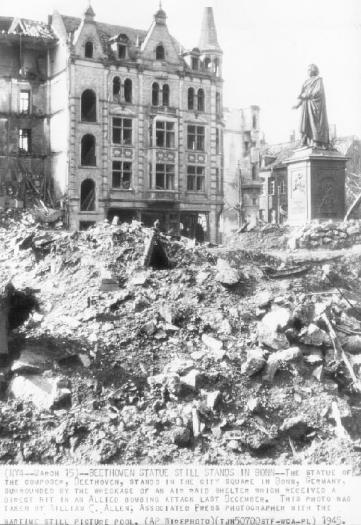
After his initial enthusiasm for Napoleon, Beethoven was later outraged when Napoleon crowned himself emperor and unleashed his Grand Army across Europe. On November 13th, 1805, Vienna was invaded by 15,000 French soldiers who plunged the city under military rule and plundered food and valuables, occupied private homes and committed outrageous acts while demanding a huge tribute from the Viennese people to pay the cost! The resultant inflation, food shortages and deprivation was enormous and impacted Beethoven along with everybody else.
Beethoven’s personal life was a mess, and he was slovenly, nasty and miserable to deal with. He had a notoriously violent temper and was said to act like a wild man on occasion. His piano playing was so strong that he snapped the strings and splintered the hammers of his Viennese pianos. Beethoven often disregarded prescribed 18th-century protocol, in his personal life as well as in his music. It is said that he once returned to a ballroom still buttoning up his trousers after urinating.
Beethoven was an introspective man and an avid walker. He never married nor had children, and he suffered from a variety of health problems. Between 1803 and 1812, he was steadily losing his hearing, yet during this same time, he created one masterpiece after another. He was once described by a Dr. W. Christian Muller in 1820: “Everything about his appearance is powerful, much of it coarse, like the raw-boned structure of his face, with a high, broad forehead, a short, angular nose, with hair standing up and divided into thick locks. But he is blessed with a delicate mouth and with beautiful, eloquent eyes which reflect at every moment his quickly changing ideas and feelings.”

|
|

|
When Beethoven lifted his baton, it is said that he stood in front of the conductor’s stand and rolled back and forth like a madman, stretching to his full height, then crouching down to the floor where he flailed about with his hands and feet. He was completely deaf at this point.
After the performance, which was interrupted several times by applause, the mezzo soprano had to tug on the distracted master’s sleeve so that he would turn around and acknowledge the cheering audience. On March 26, 1827, a severely ill Beethoven went into a coma, and during a violent thunderstorm he opened his eyes momentarily, raised up his right hand toward the sky with a clenched fist, and died. Over 20,000 people lined the streets for his funeral three days later.

Evening, Monday, July 6
You are suffering, my dearest creature – only now have I learned that letters must be posted very early in the morning on Mondays to Thursdays – the only days on which the mail-coach goes from here to K. – You are suffering – Ah, wherever I am, there you are also – I will arrange it with you and me that I can live with you. What a life!!! thus!!! without you – pursued by the goodness of mankind hither and thither – which I as little want to deserve as I deserve it – Humility of man towards man – it pains me – and when I consider myself in relation to the universe, what am I and what is He – whom we call the greatest – and yet – herein lies the divine in man – I weep when I reflect that you will probably not receive the first report from me until Saturday – Much as you love me – I love you more – But do not ever conceal yourself from me – good night – As I am taking the baths I must go to bed – Oh God – so near! so far! Is not our love truly a heavenly structure, and also as firm as the vault of heaven?
Good morning, on July 7
Though still in bed, my thoughts go out to you, my Immortal Beloved, now and then joyfully, then sadly, waiting to learn whether or not fate will hear us – I can live only wholly with you or not at all – Yes, I am resolved to wander so long away from you until I can fly to your arms and say that I am really at home with you, and can send my soul enwrapped in you into the land of spirits – Yes, unhappily it must be so – You will be the more contained since you know my fidelity to you. No one else can ever possess my heart – never – never – Oh God, why must one be parted from one whom one so loves. And yet my life in V is now a wretched life – Your love makes me at once the happiest and the unhappiest of men – At my age I need a steady, quiet life – can that be so in our connection? My angel, I have just been told that the mailcoach goes every day – therefore I must close at once so that you may receive the letter at once – Be calm, only by a clam consideration of our existence can we achieve our purpose to live together – Be calm – love me – today – yesterday – what tearful longings for you – you – you – my life – my all – farewell. Oh continue to love me – never misjudge the most faithful heart of your beloved. ever thine ever mine ever ours